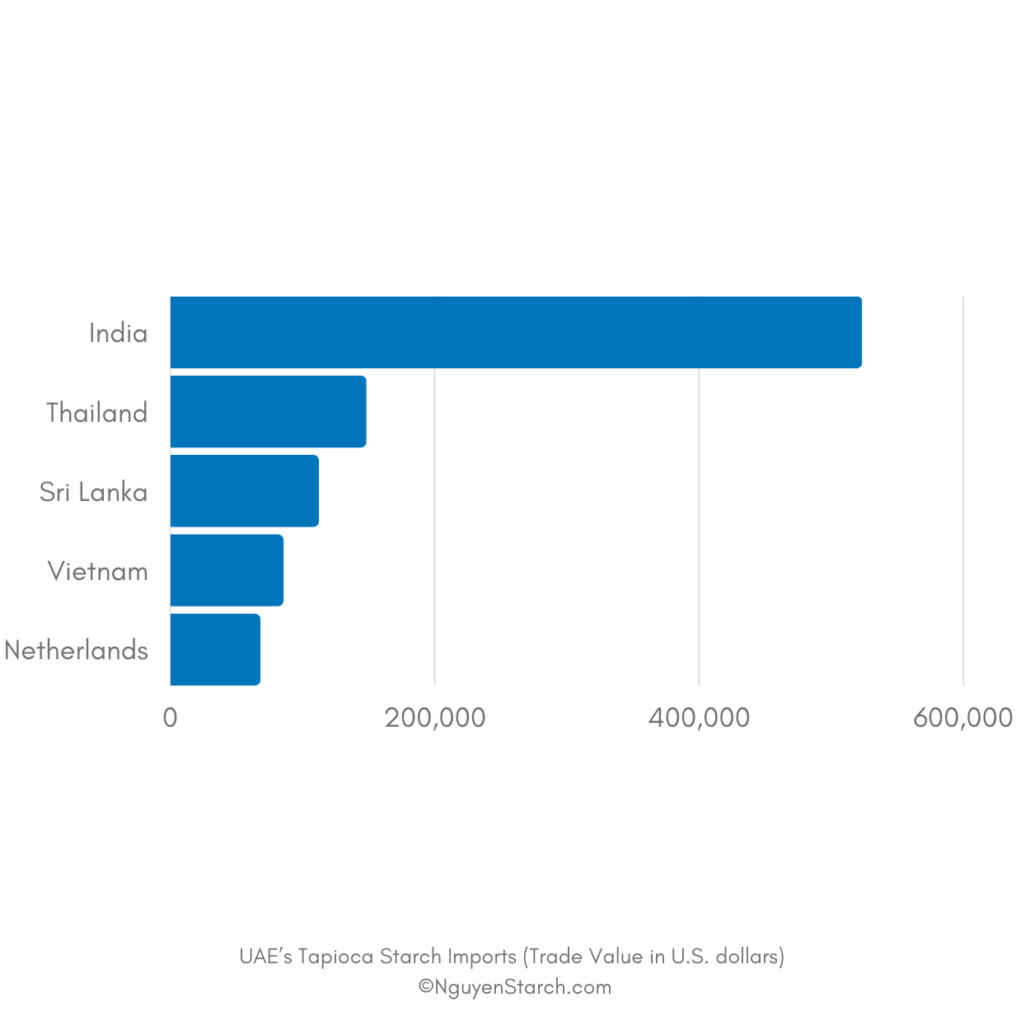The United Arab Emirates’ involvement in the global tapioca starch trade signifies its growing significance as both an exporter and importer. With notable export performance and a reliance on imports to meet domestic demands, the UAE showcases its potential for growth in the tapioca starch industry.

Exports
In 2021, the United Arab Emirates (UAE) made its mark in the tapioca starch trade, exporting a total of $2.29k worth of the product. This achievement positioned the UAE as the 80th largest exporter of tapioca starch globally. While tapioca starch ranked as the 4402nd most exported product from the UAE in the same year, its export figures highlight the country’s growing participation in the international market.
The primary destinations for UAE’s tapioca starch exports included Oman ($1.95k), the Maldives ($319), and Afghanistan ($30). These countries played a significant role in driving the UAE’s export growth and expanding the reach of its tapioca starch products.
Between 2020 and 2021, the UAE experienced notable growth in its export markets for tapioca starch. The Maldives witnessed a substantial increase of $319, indicating the growing demand for UAE’s tapioca starch in this market. Afghanistan contributed an additional $30, further demonstrating the UAE’s expanding export opportunities.
| Continent | Country | Trade Value |
| Asia | Afghanistan | 30 |
| Asia | Maldives | 319 |
| Asia | Oman | 1,945 |
Imports
In 2021, the UAE imported $1.04M worth of tapioca starch, establishing itself as the 43rd largest importer of tapioca starch in the world. While tapioca starch ranked as the 3351st most imported product in the UAE during the same year, the import data underscores the country’s reliance on foreign sources to meet its domestic requirements.
India emerged as the leading supplier of tapioca starch to the UAE, with imports amounting to $523k. Thailand followed closely behind with $148k, while Sri Lanka contributed $112k, Vietnam supplied $85.2k, and the Netherlands provided $67.8k. These countries played a significant role in fulfilling the UAE’s growing demand for tapioca starch.
Between 2020 and 2021, the UAE witnessed substantial growth in its import markets for tapioca starch. India experienced a remarkable surge of $503k, reinforcing its position as a key tapioca starch supplier to the UAE. Sri Lanka contributed an additional $73.3k, while Ghana supplied $33.4k, further highlighting the UAE’s expanding import requirements.
| Continent | Country | Trade Value |
| Africa | Ghana | 43,641 |
| Africa | Kenya | 81 |
| Africa | Nigeria | 10,394 |
| Africa | Rwanda | 2,280 |
| Africa | Tanzania | 602 |
| Africa | Uganda | 423 |
| Asia | Indonesia | 100 |
| Asia | India | 522,891 |
| Asia | Lebanon | 184 |
| Asia | Sri Lanka | 111,964 |
| Asia | Oman | 520 |
| Asia | Thailand | 147,867 |
| Asia | Turkey | 14,042 |
| Asia | Vietnam | 85,165 |
| Asia | Chinese Taipei | 201 |
| Europe | Belgium | 21,195 |
| Europe | United Kingdom | 608 |
| Europe | Hungary | 955 |
| Europe | Netherlands | 67,764 |
| Europe | Portugal | 587 |
| South America | Brazil | 6,898 |
Importing Tapioca Starch from Vietnam: A Reliable Partnership
Vietnam has emerged as a prominent supplier of tapioca starch to the UAE market. In 2021, the total value of tapioca starch imports from Vietnam amounted to an impressive $85,165. This significant figure indicates that Vietnam’s tapioca starch holds a strong position in the market and is poised to maintain its presence in UAE in the years to come. The reasons behind this sustained importation are primarily attributed to the product’s superior quality and competitive pricing.
UAE benefits from Vietnam’s tapioca starch exports, which provide a dependable supply of this vital ingredient. The substantial import value from Vietnam underscores UAE’s confidence in Vietnam as a trusted and preferred partner for fulfilling its tapioca starch requirements. With its consistent quality and competitive pricing, Vietnam’s tapioca starch has proven to be a reliable source that meets UAE’s demand for this essential product.
Tariffs
In 2018, the average tariff rate for tapioca starch in the UAE was 4.81%. Notably, several countries imposed higher import tariffs on this product, including Angola, Burundi, Benin, Burkina Faso, and Botswana. These nations maintained a Most Favored Nation duty rate treatment, resulting in a 5% tariff on tapioca starch imports into the UAE.
The presence of higher import tariffs in these countries creates trade barriers and potential cost implications for the UAE’s tapioca starch imports. Policymakers and stakeholders need to consider these tariffs when formulating import strategies and engaging in trade negotiations to ensure a balanced and sustainable market for tapioca starch in the UAE.
Source: BACI and General Statistics Office of Vietnam
